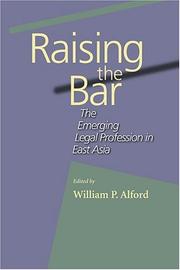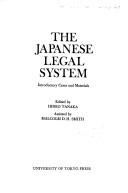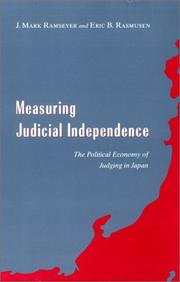| Listing 1 - 6 of 6 |
Sort by
|
Book
ISBN: 9789004274198 Year: 2015 Volume: 2 Publisher: Leiden Brill Nijhoff
Abstract | Keywords | Export | Availability | Bookmark
 Loading...
Loading...Choose an application
- Reference Manager
- EndNote
- RefWorks (Direct export to RefWorks)
S08/0820 --- J4700.90 --- J4710 --- K9585 --- K9580 --- China: Law and legislation--Administration of justice: since 1949 --- Japan: Law and jurisprudence -- history -- postwar Shōwa (1945- ), Heisei period (1989- ), contemporary --- Japan: Law and jurisprudence -- judicial organization and procedures --- Korea: Law and jurisprudence -- judicial organization and procedures --- Korea: Law and jurisprudence -- general and history
Book
ISBN: 9789033475856 Year: 2009 Publisher: Leuven Acco
Abstract | Keywords | Export | Availability | Bookmark
 Loading...
Loading...Choose an application
- Reference Manager
- EndNote
- RefWorks (Direct export to RefWorks)
Academic collection --- Jury trials --- Jury --- Law --- Rule of law --- #SBIB:328H53 --- Instellingen en beleid: Japan --- #SBIB:95G --- Geschiedenis van Azië (inclusief Arabische wereld, Nabije Oosten) --- Japan --- History --- 20th century --- 21st century --- Political aspects --- Democracy --- J4710 --- Japan: Law and jurisprudence -- judicial organization and procedures

ISBN: 0674014529 9780674014527 Year: 2007 Publisher: Cambridge East Asian legal studies Harvard law school
Abstract | Keywords | Export | Availability | Bookmark
 Loading...
Loading...Choose an application
- Reference Manager
- EndNote
- RefWorks (Direct export to RefWorks)
Lawyers --- Avocats --- J4710 --- J4719 --- K9585 --- Japan: Law and jurisprudence -- judicial organization and procedures --- Japan: Law and jurisprudence -- judicial organization and procedures -- lawyers --- Korea: Law and jurisprudence -- judicial organization and procedures --- S08/0350 --- Advocates --- Attorneys --- Bar --- Barristers --- Jurists --- Legal profession --- Solicitors --- Representation in administrative proceedings --- China: Law and legislation--General works and codices: since 1949 --- Legal status, laws, etc. --- Persons

ISBN: 0860081613 Year: 1977 Publisher: Tokyo University of Tokyo press
Abstract | Keywords | Export | Availability | Bookmark
 Loading...
Loading...Choose an application
- Reference Manager
- EndNote
- RefWorks (Direct export to RefWorks)
J4710 --- J4700.90 --- J4700.70 --- Japan: Law and jurisprudence -- judicial organization and procedures --- Japan: Law and jurisprudence -- history -- postwar Shōwa (1945- ), Heisei period (1989- ), contemporary --- Japan: Law and jurisprudence -- history -- Kindai (1850s- ), bakumatsu, Meiji, Taishō --- -Rechtsbeginselen. Juridische methodologie.--Japan --- Law --- 340 <520> --- Acts, Legislative --- Enactments, Legislative --- Laws (Statutes) --- Legislative acts --- Legislative enactments --- Jurisprudence --- Legislation --- 340 <520> Rechtsbeginselen. Juridische methodologie.--Japan --- Rechtsbeginselen. Juridische methodologie.--Japan --- Rechtsbedeling. Japan. --- Justice. Organisation. Japon. --- Justice. Administration. Japon. --- Rechterlijke organisatie. Japan.
Book
ISBN: 9781783472789 1783472782 9781783472796 Year: 2014 Publisher: Cheltenham Elgar
Abstract | Keywords | Export | Availability | Bookmark
 Loading...
Loading...Choose an application
- Reference Manager
- EndNote
- RefWorks (Direct export to RefWorks)
J4700.90 --- J4710 --- J4791 --- S08/0350 --- K9580 --- K9585 --- Japan: Law and jurisprudence -- history -- postwar Shōwa (1945- ), Heisei period (1989- ), contemporary --- Japan: Law and jurisprudence -- judicial organization and procedures --- Asia: Law and jurisprudence --- China: Law and legislation--General works and codices: since 1949 --- Korea: Law and jurisprudence -- general and history --- Korea: Law and jurisprudence -- judicial organization and procedures --- Law --- Judge-made law --- Comparative law. --- Droit --- Droit créé par le juge --- Droit comparé --- History --- Histoire --- University of Washington. --- Comparative law --- Legal theory and methods. Philosophy of law --- Asia

ISBN: 1282537695 9786612537691 0226703878 9780226703879 9780226703886 0226703886 9781282537699 6612537698 Year: 2003 Publisher: Chicago University of Chicago Press
Abstract | Keywords | Export | Availability | Bookmark
 Loading...
Loading...Choose an application
- Reference Manager
- EndNote
- RefWorks (Direct export to RefWorks)
The role of the U.S. Supreme Court in the aftermath of the 2000 presidential election raised questions in the minds of many Americans about the relationships between judges and political influence; the following years saw equally heated debates over the appropriate role of political ideology in selecting federal judges. Legal scholars have always debated these questions-asking, in effect, how much judicial systems operate on merit and principle and how much they are shaped by politics. The Japanese Constitution, like many others, requires that all judges be "independent in the exercise of their conscience and bound only by this Constitution and its laws." Consistent with this requirement, Japanese courts have long enjoyed a reputation for vigilant independence-an idea challenged only occasionally, and most often anecdotally. But in this book, J. Mark Ramseyer and Eric B. Rasmusen use the latest statistical techniques to examine whether that reputation always holds up to scrutiny-whether, and to what extent, the careers of lower court judges can be manipulated to political advantage. On the basis of careful econometric analysis of career data for hundreds of judges, Ramseyer and Rasmusen find that Japanese politics do influence judicial careers, discreetly and indirectly: judges who decide politically charged cases in ways favored by the ruling party enjoy better careers after their decisions than might otherwise be expected, while dissenting judges are more likely to find their careers hampered by assignments to less desirable positions. Ramseyer and Rasmusen's sophisticated yet accessible analysis has much to offer anyone interested in either judicial independence or the application of econometric techniques in the social sciences.
Judges --- Judicial process --- Political questions and judicial power --- Courts --- Judicial activism --- Judicial power and political questions --- Act of state --- Administrative discretion --- Judicial review --- Jurisdiction --- Law --- Rule of law --- Separation of powers --- Decision making, Judicial --- Judicial behavior --- Judicial decision making --- Procedure (Law) --- Political aspects --- Psychological aspects --- Interpretation and construction --- J4700.90 --- J4701 --- J4709 --- J4710 --- J4712 --- Japan: Law and jurisprudence -- history -- postwar Shōwa (1945- ), Heisei period (1989- ), contemporary --- Japan: Law and jurisprudence -- policy, legislation, guidelines, codes of behavior --- Japan: Law and jurisprudence -- theory, methodology and philosophy --- Japan: Law and jurisprudence -- judicial organization and procedures --- Japan: Law and jurisprudence -- judicial organization and procedures -- court and trials --- supreme court, legal system, judiciary, political influence, politics, selection, federal judges, merit, principle, japan, japanese constitution, communism, ideology, criminal, government, justice, taxpayers, constitutional law, injunctions, malapportionment, military, elections, protest, activism, free speech, nonfiction, judicial process, power, courts, decision making.
| Listing 1 - 6 of 6 |
Sort by
|

 Search
Search Feedback
Feedback About UniCat
About UniCat  Help
Help News
News